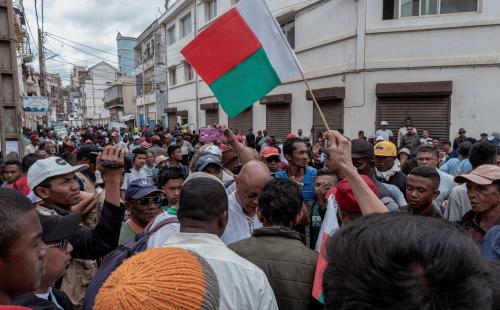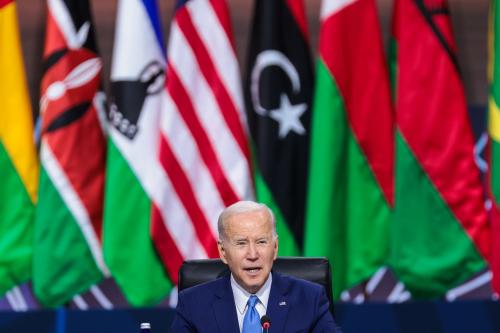

10:00 am EDT - 11:00 am EDT
Past Event
On July 28, Brookings’s Africa Security Initiative hosted a discussion of U.S. policy toward Zimbabwe featuring George Ward of the Institute for Defense Analysis, Michelle Gavin of the Council on Foreign Relations, Dewa Mavhinga of Human Rights Watch, and Piers Pigou of International Crisis Group. Brookings Senior Fellow Michael O’Hanlon moderated the conversation.
In giving an overview of the recent political and economic climate in Zimbabwe, Mavhinga began by noting an increase in targeted abuse against government critics such as human rights lawyers, civil society activists, the opposition party, and independent media. Particularly, he reported that under the leadership of President Emmerson Mnangagwa, the ruling party (ZANU-PF) utilizes abduction, kidnapping, invasion of property, arbitrary arrests, and torture to squash dissent. State seizure of human rights lawyer Siphosami Malunga’s land and the arrest of civil society activist Tsitsi Dangarembga are recent examples, he added.
Describing Zimbabwe as a military dictatorship, Mavhinga commented that since taking over from Robert Mugabe in 2017, under the banner of government reforms, Mnangagwa has employed few measures to “improve people’s lives, rein in on corruption, and show commitment to justice, human rights and respect for the rule of law.” On the contrary, Mnangagwa has taken advantage of his party’s two-thirds parliamentary majority to alter the law and control the judiciary.
Pigou emphasized that Mnangagwa’s administration “promised a breath of fresh air” after Mugabe, so some countries agreed “to give Zimbabwe a chance at re-engagement and reform strategies.” Unfortunately, hopes faded as power retention for the ruling party remained at the center of Zimbabwe’s politics and policy. Pigou explained that heightened violence in 2018 and 2019 was a result of crackdowns on protests against human rights violations. Since then, the number of abuses has declined, but a “harvest of fear” remains ahead of the 2023 elections.
Pigou stated that Zimbabwe’s economy is “in a terrible condition.” Despite the modest macroeconomic growth, “the socio-economic conditions of the vast majority of Zimbabweans are dire as more and more of them are living under the poverty line.” In other words, the improvement in both the World Bank’s and the International Monetary Fund’s report “does not translate into significant improvement in the conditions of ordinary Zimbabweans.”
Gavin reiterated that “the seemingly optimistic reports from the international institutions do not reflect a fundamental change in governance.” Still, only “a small number of elites benefit.” Gavin commended “Zimbabwean human rights activists, independent journalists and lawyers for pushing back on the abuse of the legal system and the courts” but saw limits to viable avenues of change. Regionally, South Africa continues to be “distracted by internal issues” and other “fires,” the insurgencies in Mozambique and clashes in Eswatini, which have emerged. Globally, she presented targeted sanctions as a remaining tool for reform and one currently utilized by the United States and the United Kingdom. Responding to these remarks, O’Hanlon said that Zimbabwe “can be a bellwether for both good and bad political-economic developments.”
Ward agreed with previous comments and added that COVID-19 continues to exacerbate the socio-economic conditions of Zimbabweans. Acknowledging “scarce areas for maneuver,” he proposed that members of the South African Development Community (which collectively represents 16 southern African governments from its headquarters in Botswana) play a role in future political-economic plans for Zimbabwe. “Even though small, they can have an effect,” he explained.
Ward also stressed the importance of cooperation among Western democracies. He recommended the United States show unrelenting support for the citizens of Zimbabwe with continued support for the Young African Leadership Initiative (YALI), establishing online-university education options for them, calculated investment in Zimbabwean agriculture, and by spurring American trade and investment in the country.
O’Hanlon asked whether U.S. investors should instead venture into different African countries with partial democracies and conducive business climate until Zimbabwe improves. Ward concurred with increasing investments with countries with attractive investment profiles, but also warned that “a hands-off policy until [Zimbabwe] improves… may translate into more difficulties for the people who already suffer” from poverty. Gavin recommended “demand-driven” support to strengthen regional civil societies as well as general investment in Zimbabwe’s younger generations. Ahead of 2023, Mavhinga argued that assistance for programs working to ensure free and fair elections is necessary, though precedent suggests the task is difficult.
Panelist


Witney Schneidman
April 17, 2024

Danielle Resnick
November 13, 2023

Witney Schneidman, Gracelin Baskaran
September 22, 2023